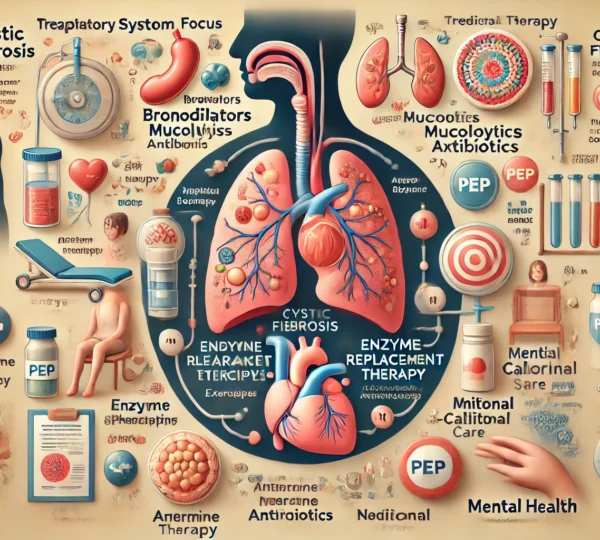Managing Cystic Fibrosis: Treatment Options and Therapies
Navigating Cystic Fibrosis: Treatment and Therapies
Cystic fibrosis (CF) management involves a variety of treatments and therapies aimed at improving respiratory function and quality of life. CF is a genetic disorder that affects the lungs, digestive system, and other organs, leading to the production of thick, sticky mucus. This mucus can clog the airways, making breathing difficult and creating an environment for lung infections. Let’s explore these options in simple terms.
Medications
1. Bronchodilators:
These medications help open the airways, making breathing easier. Common bronchodilators include albuterol and ipratropium. They can provide quick relief during asthma-like symptoms and are often used before airway clearance techniques.
2. Mucolytics:
Mucolytics, such as dornase alfa (Pulmozyme), work by thinning the mucus, making it easier to clear from the lungs. Regular use can help reduce the frequency of lung infections and improve overall lung function.
3. Antibiotics:
Antibiotics are critical in treating lung infections, which are common in CF patients. Doctors may prescribe inhaled antibiotics like tobramycin or aztreonam to target bacteria directly in the lungs, reducing the risk of serious infections.
Airway Clearance Techniques
1. Chest Physiotherapy:
Chest physiotherapy includes techniques like percussion and vibration, which help loosen mucus in the lungs. It often involves a caregiver or physical therapist who performs specific maneuvers to facilitate mucus clearance.
2. Exercise:
Regular physical activity is essential for individuals with CF. Engaging in aerobic exercises, like walking or cycling, helps clear mucus from the lungs and improves lung function. Additionally, exercise promotes overall physical and mental well-being.
3. Positive Expiratory Pressure (PEP) Devices:
PEP devices help keep the airways open during exhalation, promoting mucus clearance. These portable devices can be used at home and are effective for many CF patients.
Nutritional Support
1. Enzyme Replacement Therapy:
Due to CF, the pancreas may not produce enough digestive enzymes, leading to nutrient malabsorption. Enzyme replacement therapy helps improve nutrient absorption by providing the enzymes the body lacks. This is crucial for maintaining a healthy weight.
2. High-Calorie Diet:
Individuals with CF often require a high-calorie diet to maintain a healthy weight and meet their increased energy needs. Foods rich in healthy fats, proteins, and carbohydrates should be included in their diet to support growth and overall health.
Lung Transplant
In severe cases where lung function has significantly declined, a lung transplant may be considered. This procedure can dramatically improve quality of life and longevity for individuals with advanced CF. However, it requires careful evaluation and ongoing management.
Mental Health Support
Managing CF can be emotionally challenging. Many individuals experience anxiety, depression, or stress related to their condition. Counseling, therapy, and support groups can provide emotional support and coping strategies. Mental health is an essential aspect of comprehensive CF care.
Conclusion
While there’s no cure for cystic fibrosis, various treatments and therapies can help manage symptoms and improve quality of life. With a comprehensive approach that includes medications, airway clearance techniques, nutritional support, and mental health care, individuals with CF can lead fulfilling lives. Ongoing research continues to explore new treatments and innovations, offering hope for better management and improved outcomes.
To seek medical advice, always consult a Doctor. Here are our recommended experts. Click here
To read more on Respiratory disease . Click Here



